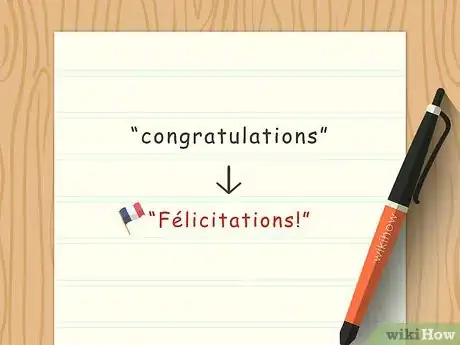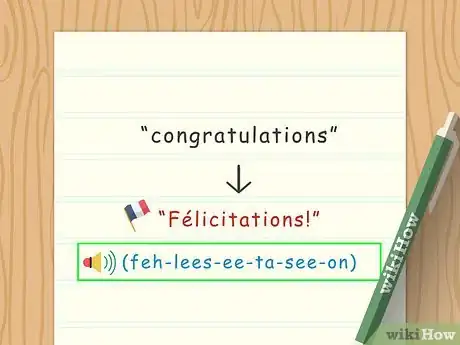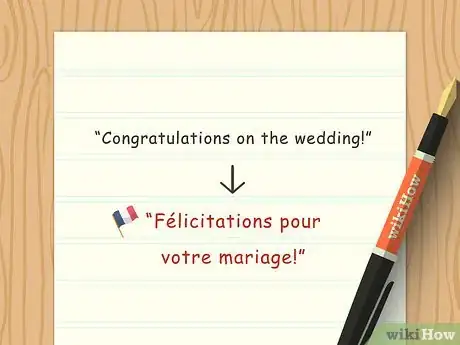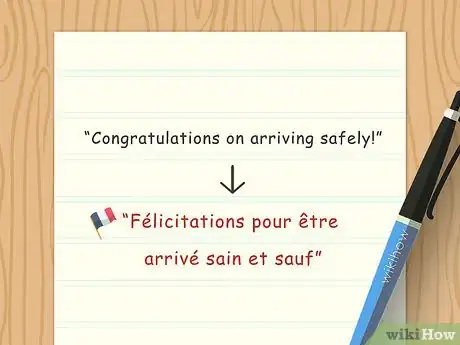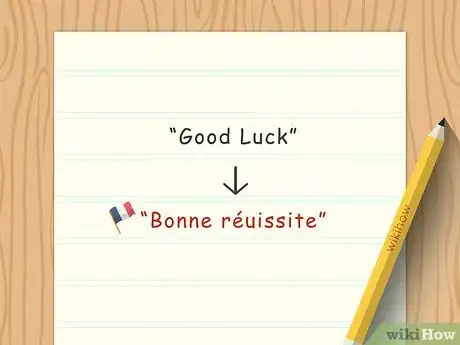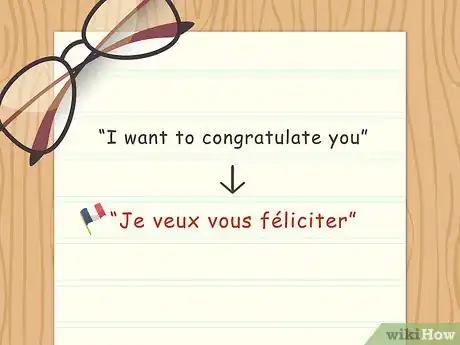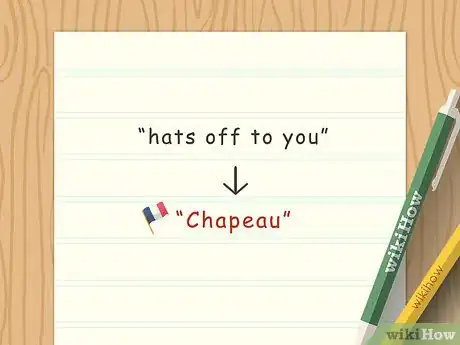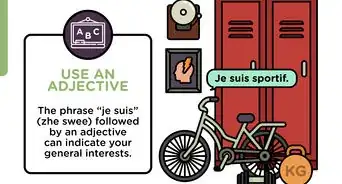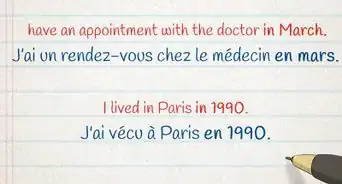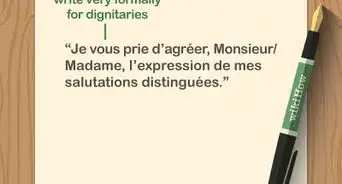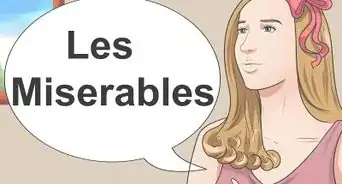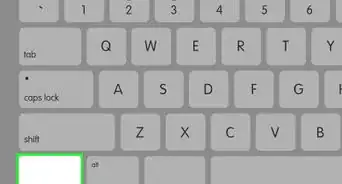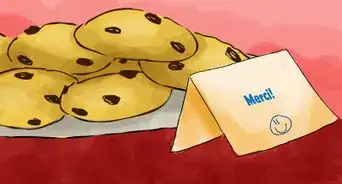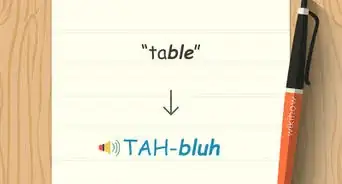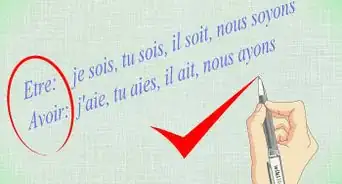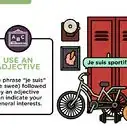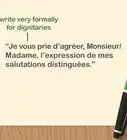X
wikiHow is a “wiki,” similar to Wikipedia, which means that many of our articles are co-written by multiple authors. To create this article, 18 people, some anonymous, worked to edit and improve it over time.
This article has been viewed 226,325 times.
Learn more...
Congratulating someone in French is no harder than in English, as long as you know the proper vocabulary. However, fluent speaking is about more than just a vocab word. Luckily, there is not a lot of memorization needed to say "Congrats" in French. Most of the translations are nearly word-for-word.
Steps
Method 1
Method 1 of 2:
Saying Congratulations
-
1Know that the French word for "congratulations" is "félicitations." You can use "félicitations" the same way in French as you do in English, by simply saying it after you hear good news.
- "I won the game!" He said. "Congratulations!" I replied.
- "J'ai gagné le match!" Il a dit. "Félicitations!" J'ai répondu.
-
2Learn how to pronounce "félicitations" correctly. Félicitations is pronounced as follows: feh-lees-ee-ta-see-on. In French, the last letter of a word is rarely pronounced, so you don't hear the "s" when you say it. Remember, also, that "i" has a long E sound in French, like in the English word "see."[1] End the word on a nasally "on" sound.
- Alternate pronunciation guide: Felleecy-Taseeyon
- Listening to a native French speaker may help you learn the pronunciation.
Advertisement -
3Congratulate someone for an event or success by adding "pour." To congratulate someone on something like their upcoming wedding, use "félicitations pour."' This is the equivalent of "Congratulations on ____."[2] For example:
- "Congratulations on the wedding!" → "Félicitations pour votre mariage!"
- "Congratulations on the promotion!" → "Félicitations pour ton avancement!"
-
4Congratulate someone on doing something by adding "pour + avoir/être."' If you want to congratulate someone on an action, such as winning a game, you need to add the verb avoir or être. Which one you add depends on if the verb is transitive (avoir) or intransitive (être).[3] A complete list of intransitive verbs can be found here, while any verbs not on this list utilize avoir. The past tense of the acting verb ("to win," for example) comes next.
- "Congratulations on winning the game!" → "Félicitations pour avoir gagné le match"
- "Congratulations on arriving safely!" → "Félicitations pour être arrivé sain et sauf."
- When in doubt, remember when you use passé compose to conjugate a verb. If the verb uses "être" in the passé compose, you use it here as well.
- Intransitive verbs are verbs, in general, related to motion.
Advertisement
Method 2
Method 2 of 2:
Variations on "Congratulations"
-
1Learn other phrases to tailor your congratulations for specific compliments. While "félicitations" works in a wide variety of situations, you may want something more specific occasionally.
- "Good work/job" → "Bon travail!"
- "Great success/Good Luck" (used interchangeably) → "Bonne réuissite."[4]
- Give my compliments to ____" → "Addressez tous mes compliments à ____"
-
2Use the verb form, "to congratulate" just like you would in English. This is the same as saying "She congratulates you." Luckily, the translation is not too difficult. "Félicitations" means congratulations, and "féliciter" means "to congratulate." Remember that, in French, the subject of the person you congratulate must come before the verb, unlike in English. Thus:
- "I want to congratulate you." → "Je veux vous féliciter."
- "The President congratulates him." → "Le Président le félicite."
- Add "pour" to make specific congratulations: "They congratulate you on the win" &rarr: "Ils vous félicitent pour le victoire."[5]
-
3Use slang or idiomatic expressions instead of a formal congratulations. Just like in English, you can use some slang terms to tell someone you're proud of them. This gives you variety, instead of always saying "félicitations."
- "Bravo!" much like in English, expresses awe at a job well done.
- "Chapeau," which translates to "hat" in English, is used in place of "hats off to you." It may, however, seem a little old-fashioned.[6]
Advertisement
Community Q&A
-
QuestionHow do I say "wedding anniversary" in French?
 Dodo47Top AnswererAnniversaire de mariage.
Dodo47Top AnswererAnniversaire de mariage. -
QuestionHow do I say, "Congratulations with your new president"?
 Community AnswerYou can say "Félicitation pour l'élection de votre/ton nouveau président."
Community AnswerYou can say "Félicitation pour l'élection de votre/ton nouveau président." -
QuestionWhat does "Au chante" mean?
 Community AnswerIt's spelled "enchante" and it means "enchanted," as in, "enchanted to meet you."
Community AnswerIt's spelled "enchante" and it means "enchanted," as in, "enchanted to meet you."
Advertisement
References
- ↑ http://ielanguages.com/frenchphrases.html
- ↑ http://en.bab.la/dictionary/english-french/congratulations-on-a-job-well-done
- ↑ https://www.laits.utexas.edu/tex/pr/tap3.html
- ↑ http://french.lovetoknow.com/How_to_Say_Congratulations_in_French
- ↑ http://dictionary.reverso.net/english-french/to%20congratulate%20sb%20on%20doing%20sth
- ↑ http://french.lovetoknow.com/How_to_Say_Congratulations_in_French
About This Article
Advertisement
